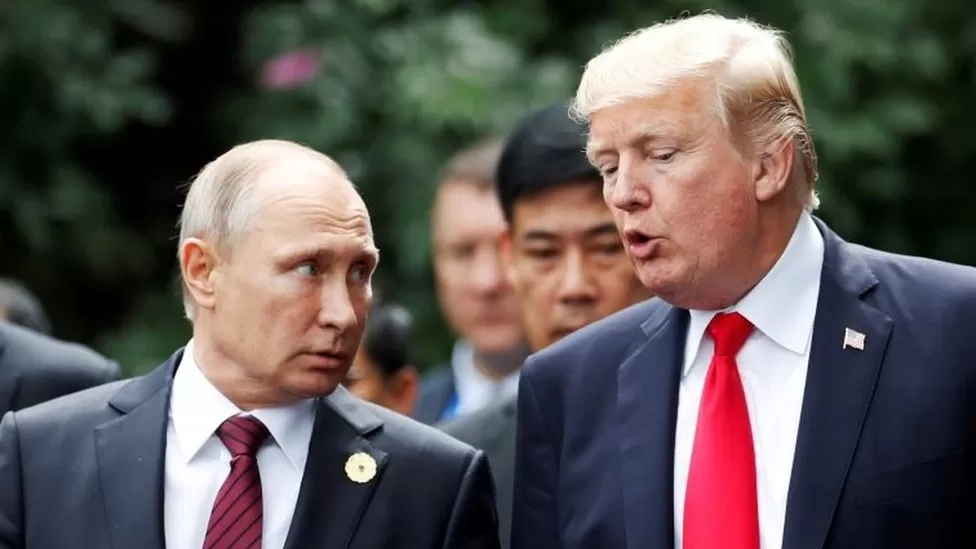
With his usual braggadocio, former President Donald Trump has promised that if returned to the White House he would end the Ukraine conflict within hours and claims, as many of his supporters do, that the war would never have taken place had he been in office. Like most of his campaign promises during his 2016 presidential run – drain the swamp, pull troops out of Afghanistan, build a wall – very few were accomplished, despite the fact that the former president had a Republican House and Senate at the start of his first term.
Listening to Trump’s often incoherent statements on the Ukrainian imbroglio shows that the ex-chief executive has learned little from his four years in the Oval Office. While talk of ending wars in a few hours may garner popular support, translating them into actual results is a far different and, to say the least, difficult matter, as Trump should now realize after his fruitless years as president.
Trump had a chance to de-escalate tensions in the Ukraine that had been building especially after the Western-inspired coup of February, 2014 which replaced the democratically-elected government of Viktor Yanukovych. Yet, the former president did nothing to remedy the situation and, in fact, worsened matters by providing military hardware to the Ukraine, which the Obama Administration had denied.
Demonstrating a lack of understanding of the region’s geo-political realities, Trump decided to provide the Ukraine with military equipment. In December, 2017 the U.S. shipped, among other weaponry, Javelin anti-tank missile systems, with the first sale completed in March of the following year to the sum of $47 million. Reportedly, the former president was convinced by his advisors that the military aid would be “good for U.S. business.”
If one considers the military industrial complex a vibrant part of the U.S. economy and not a parasitical drain that redistributes scarce resources away from the production of useful consumer goods into the creation of destabilizing and murderous weapons of war, then – “yes” – military spending is good for business. For those, like Trump, who support such an idea are apparently unfamiliar with Brigadier General Smedley D. Butler who rightly called “defense spending” a racket:
I spent 33 years in the Marines, most of my time being a high-class muscle man for big business, for Wall Street and the bankers. In short, I was a racketeer for Capitalism.*

After the provocative action of supplying the Ukraine with military hardware, the Trump Administration inflamed relations further by pulling out of the Intermediate-Range Nuclear Forces Treaty (INF) which was agreed to by President Ronald Reagan and Soviet leader Mikhail Gorbachev in 1987. The landmark treaty banned missiles with range between 500 and 5,500 km (310-3,400 miles).**

The U.S. accused Russia of non-compliance to the terms of the treaty, a charge that the Russians and many military analysts denied. This, of course, led to a greater level of distrust between the two nations and went against candidate Trump’s aims of lessening tensions between the two powers.
Trump, as with the pro-war Western media, is ignorant of the historical context that played into Vladimir Putin’s decision to invade the Ukraine. It is a well-established fact that the U.S. and Western powers gave assurances to Russia as far back as when the Berlin Wall came down that NATO would not expand eastward. That promise has been repeatedly broken as NATO now includes 31 nations with Sweden set to come on board in 2024.***
Making matters worse, the Biden Administration, the war mongers in Congress, and the U.S.’s NATO lapdogs have escalated matters with tremendous financial and military assistance, which has done little to stop the Russians, but has resulted in the needless slaughter of thousands and the wholesale destruction of Ukrainian territory. The introduction of cluster bombs into the fray and the promise of F-16 fighter-jets capable of carrying nuclear war heads has heightened the possibility of a general conflagration.
None of the declared Republican presidential contenders have critiqued the former president’s reckless Ukrainian policy. Some of the candidates (Chris Christie, Nikki Haley) have instead insanely called for greater support of the Zelensky regime!
The American involvement in the Ukrainian War has nothing to do with its national security, but with the interests of the U.S. Empire. The tragedy of the Trump Presidency is that things were supposed to be different. Instead of non-intervention, the Administration armed Ukraine, stationed troops in Syria, assassinated an Iranian general on a Middle East peace mission, and committed a host of other head scratching acts which went against candidate Trump’s pledge of an “America First” foreign policy that propelled him to victory in 2016.
To think that things will be different in a second go-around is clearly delusional, as the former president is now campaigning with never-ending war proponent Senator Lindsey Graham.
*See War is a Racket, Port Townsend, WA.: Feral House, 2003; 1935.
**“INF Nuclear Treaty: US Pulls Out of Cold War-Era Pact With Russia,” BBC, 2 August 2019. https://www.bbc.com/news/world-us-canada-49198565
***Patrick Wintour, The Guardian, 22 January 2022 ttps://www.theguardian.com/world/2022/jan/12/russias-belief-in-nato-betrayal-and-why-it-matters-today
Antonius Aquinas@AntoniusAquinas

Pingback: President Trump’s Role in the Ukraine War – news.freeptomaineradio.com
Hey boss you came with this crap your self or you had help from Tel Aviv synagogue of satan ????
When you elect a clown; you get a circus. We can do better.
Who do you suggest that might be?
And who might that “better” be, Steven?
Trump’s enemies are my enemies.
Trump’s supporters are my people.
Still the best candidate. Sad to say.
trumps boss will still be satanyahoo. His legacy includes, “warp speed”, filling the swamp, cancelling the Iran agreement for israel, and, well there’s not enough space here
For a future at all, look to DJT….